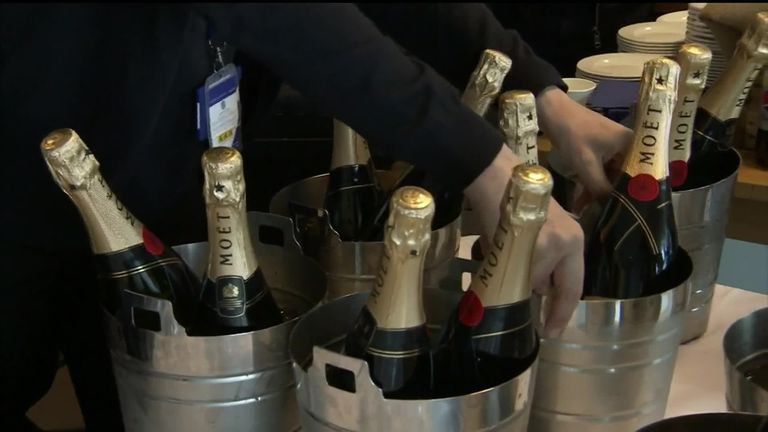Why Dior deal may leave Diageo waiting for Moet Hennessy ownership
Sky's Ian King says the UK drinks firm's wish for full control of Moet Hennessy was not aided by Bernard Arnault's Dior move.
Tuesday 25 April 2017 14:42, UK
It's often tricky when a brand has more than one owner or when different extensions of a brand have different owners.
For example, the Hilton Hotels brand was for many years split, with the US business owned by the US-based Hilton Hotel Corporation and operations in the rest of the world owned by Britain's Ladbrokes.
Foster's, the Australian lager, is owned by brewing giant AB InBev everywhere in the world, apart from Europe, where it is owned by Heineken.
Similarly, many people - including some journalists - continue to be confused by the fact that Rolls-Royce Motors is owned by BMW and not by Rolls-Royce, the aircraft engine maker.
Today, such confusion concerning Christian Dior, one of the world's most famous names in fashion and luxury goods, is brought to an end in put together by Bernard Arnault, one of France's richest and wiliest businessmen.
It is a complicated deal but the key headline behind it is that, for the first time in 70 years, the whole of the Christian Dior brand will be united under one roof.
Previously, Dior's fragrance and cosmetics businesses were owned by Louis Vuitton Moet Hennessy (LVMH), the luxury goods business in which Mr Arnault and his family were major shareholders.
And the Christian Dior Couture business, comprising leatherware, Haute Couture, ready-to-wear, jewellery and shoes, was owned by the separately listed Christian Dior PA, in which the Arnault family were also major shareholders.
To add to the confusion, Christian Dior PA also owned 41% of LVMH.
So what's behind the deal? Well, on one level, this represents a significant tidying-up of Mr Arnault's business affairs.
It will raise his family's shareholding in LVMH from the present 35% to 46%. It is something minority shareholders in both LVMH and Christian Dior PA have wanted for a while.
The other strand is the opportunity LVMH now has from owning all aspects of the Dior name.
At present, the fragrances business is by far the bigger, generating operating profits last year of €551m on sales of €4.95bn, while Christian Dior Couture made profits of €270m on sales "in excess of €2bn", according to Tuesday's statement.
What is striking, though, is that the Couture business appears to be growing more rapidly. Its sales have doubled during the past five years while the fragrances business has only grown sales by 55% in that time.
But both are out-performing the wider luxury goods market which, during the last few years, has been rattled by a number of factors.
They include terrorism in Europe, which has prevented some well-heeled Asian and American tourists from coming over to snap up bargains; the clampdown on corruption in China, which has prevented officials from giving and receiving gifts and squalls in emerging markets, whose customers have been of growing importance to the sector.
The market is also highly fragmented. The banking group Macquarie estimates the two arms of the Christian Dior name still only account for 1.8% of the global luxury goods market, trailing the likes of Burberry, Prada, Gucci, Hermes, Chanel and Louis Vuitton itself.
So there is plenty of scope for the Christian Dior name, thanks to the opportunities provided by unification, to grow both sales and market share during coming years. During Tuesday's presentation to investors, LVMH pointed out that 93% of Christian Dior Couture's sales are generated in its global network of just 198 stores, indicating the potential to grow sales through other channels should the company see fit.
Customers of the Christian Dior brand have also, during recent years, proved less resistant to price increases than the customer of rival luxury brands and this will also have undoubtedly influenced Mr Arnault's thinking. The deal also lessens LVMH's dependence on the Louis Vuitton brand itself in future.
But the new deal also raises other questions about LVMH. The acquisition of Christian Dior Couture makes this flagship French company more rooted than ever in fashion, perfumes and other luxury accessories. Wines and spirits are of diminishing significance.
LVMH owns 66% of Moet Hennessy, the champagne and cognac house, with the other 34% owned by Diageo, the UK spirits giant, which has made no secret of its desire to take full control.
The assumption has always been that, until Mr Arnault needed the cash to buy another fashion house, no deal would be possible. Cunningly, Mr Arnault has avoided this for now, by using his family's shares in another luxury brand, Hermes, as his acquisition currency.
It looks as if Diageo may have to wait a little longer.




